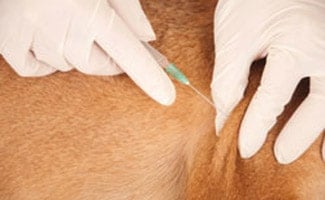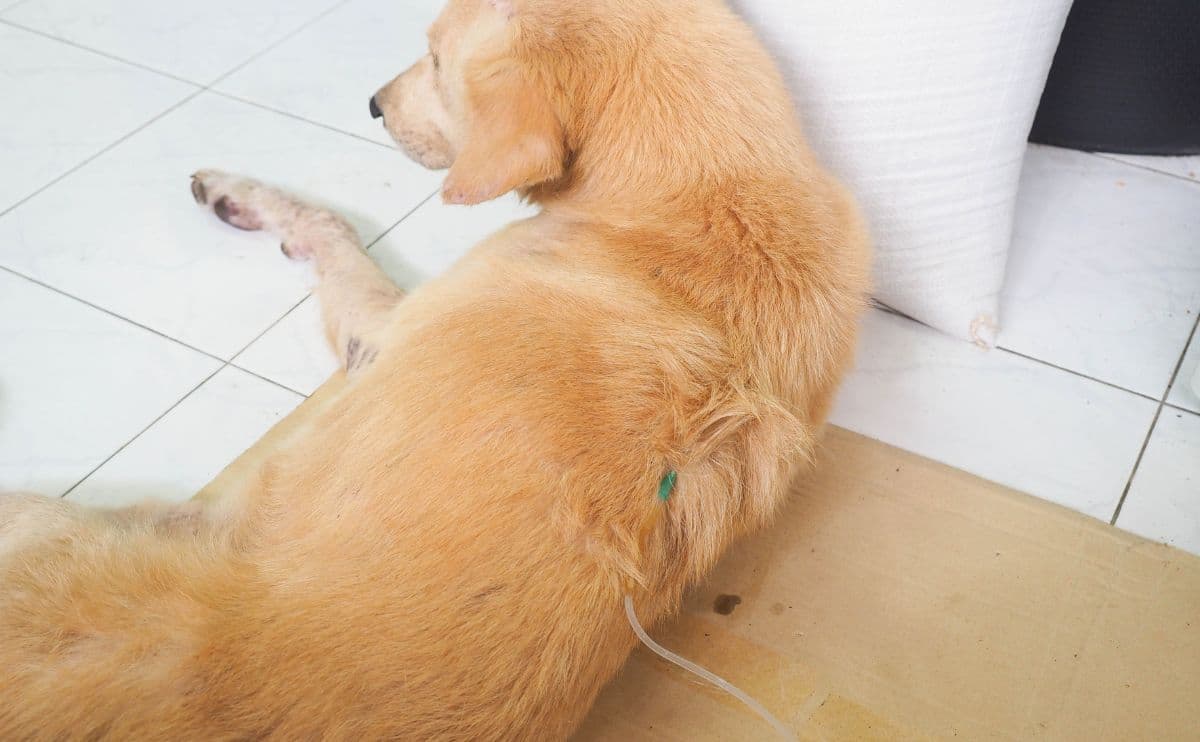This content was reviewed by a veterinarian.
When you purchase through links on our site, we may earn a commission. Here’s how it works.
Is your dog coughing more than usual? Is he making a hacking sound (like he has a hairball stuck in his throat)? Has he recently spent time around other pups? If so, he could have kennel cough — also called canine infectious tracheobronchitis.
In most cases, kennel cough isn’t serious and will clear up without treatment. However, in some dogs, the disease can be more severe. Learn more about the symptoms, when you should seek veterinary care, and how you can reduce your dog’s risk of contracting this highly contagious illness.
What Is Kennel Cough?
Kennel cough is a respiratory tract infection that causes your dog’s upper airway to become inflamed. It can spread deep into the lungs and cause pneumonia in severe cases.
Dogs can contract kennel cough in several ways, such as inhaling infectious bacteria or virus particles in the environment, direct contact with an infected dog, or contaminated surfaces (e.g., food and water bowls, toys, bedding, or kennels).
The most common bug that causes kennel cough is the bacterium Bordetella bronchiseptica. In most cases, dogs infected with Bordetella are also infected with a virus simultaneously. These viruses can include canine adenovirus, canine respiratory coronavirus, canine parainfluenza virus, canine distemper virus, and canine herpes virus.
Canine Respiratory Disease Outbreak
In 2023, veterinarians saw an increase in canine respiratory disease spread across the U.S. Regular treatment methods have no impact on the illness, and the cause is unknown. Affected dogs suffer from a more severe and longer respiratory disease than what is typical of other canine infectious respiratory disease (CIRD) complex, a common type of kennel cough.
Symptoms of the outbreak include coughing, sneezing, labored breathing, discharge from the nose or eyes, lethargy, and decreased appetite. If you are concerned about your dog’s health, we recommend contacting your vet.
Which Dogs Are At High Risk For Kennel Cough?

Many dogs will get kennel cough at least once during their life. This disease can spread quickly in overcrowded spaces like doggie daycare centers, boarding facilities, and grooming parlors, putting these pups at a higher risk of catching it. But, it can also spread easily at dog parks, training groups, pet stores, etc.
In addition to overcrowded places, several other factors can make dogs more susceptible to kennel cough infection. These include cold temperatures, exposure to dust or smoke, and stress.
Puppies under six months can experience some of the most severe symptoms since their immune systems aren’t fully developed. But puppies aren’t the only ones at risk. Older dogs and pregnant dogs also have decreased immune capabilities making them more susceptible to severe infection.
Kennel Cough Symptoms

Dogs with kennel cough may appear completely normal. The main symptom you’ll notice is their cough, which can last for weeks (2-3 usually) after infection. Below are some additional symptoms:
- Cough that has a honking sound
- Runny nose and eyes
- Sneezing
- Fever
- Gagging and coughing up phlegm (worse after exercise or excitement)
- In severe cases (e.g., with pneumonia), lack of appetite, fever, lethargy, and possibly death (rare)
Should My Dog See The Vet?
Even though kennel cough is mild in most cases, coughing can be a sign of other more serious conditions. For example, heart disease, bronchitis, tumors, allergies, a collapsing trachea, and foreign bodies can all cause your dog to cough. So you should always contact your vet if your dog has a cough. In addition, severe cases of kennel cough that cause your dog to be off their food or subdued should also see a vet.
Kennel Cough Treatment

If your dog has minor symptoms but is well otherwise, then no treatment is required, and you can let the cough run its course. The cough will get better in most cases. However, your vet might prescribe antibiotics as a precaution if your dog is vulnerable or off-color. Also, anti-inflammatory medication can be given to your dog to reduce the coughing episodes and help your dog feel more comfortable.
Contact your vet if your dog doesn’t improve after a few days. Especially if they’re not eating, have a fever, or have any breathing problems — it may indicate pneumonia which requires additional treatment.
While your pup is recovering from kennel cough, remove anything from around his neck that can restrict the airflow. This includes collars, scarves, and bandanas. Use a harness instead of a collar for walking your dog to prevent stimulation of the coughing reflex as their throat will be very sensitive to pressure. Having your dog in a well-humidified area (such as a bathroom when you shower) can also help ease the coughing.
Kennel Cough Vaccine

The Bordetella vaccine is classified as a non-core vaccine. Non-core vaccines are given to dogs at most risk, so veterinarians recommend that dogs frequently exposed to other dogs have the kennel cough vaccine. In addition, many facilities, such as boarding kennels, doggy daycare, training classes, and dog shows will require this vaccine.
There are three ways of giving the Bordatella vaccine: injection, nasal mist, and oral. Immunizing for kennel cough is done during your pup’s regular vet visits, so if you expect your dog to spend time around other animals, ask them about the vaccine. The vaccine is typically given to dogs once a year, but it’s recommended every six months if your pup is high risk.
The nasal mist and oral vaccine protect the animal sooner than the injectable vaccine. However, while these vaccines reduce the likelihood of illness, they don’t guarantee your pup won’t get sick. Bordatella is only one of several different bacteria and viruses that can cause kennel cough. Also, the vaccine does not treat active infections.
What Does Kennel Cough Sound Like?
Here’s a video of a family of dogs with kennel cough. This may help you recognize the symptoms if you suspect your pup may be ill.
Other Dog Health Issues
It’s important to know about other health issues that may affect your dog. Take the time to learn about the most common health problems with dogs, so you’re prepared should anything happen. Also, make sure your dog is up to date with all his vaccinations.
As always, we can’t recommend getting dog insurance enough. It saves you from paying extensive out-of-pocket expenses should an illness like kennel cough arise unexpectedly.
Tagged With: Infectious Disease, Reviewed By Veterinarian, Vaccinations

